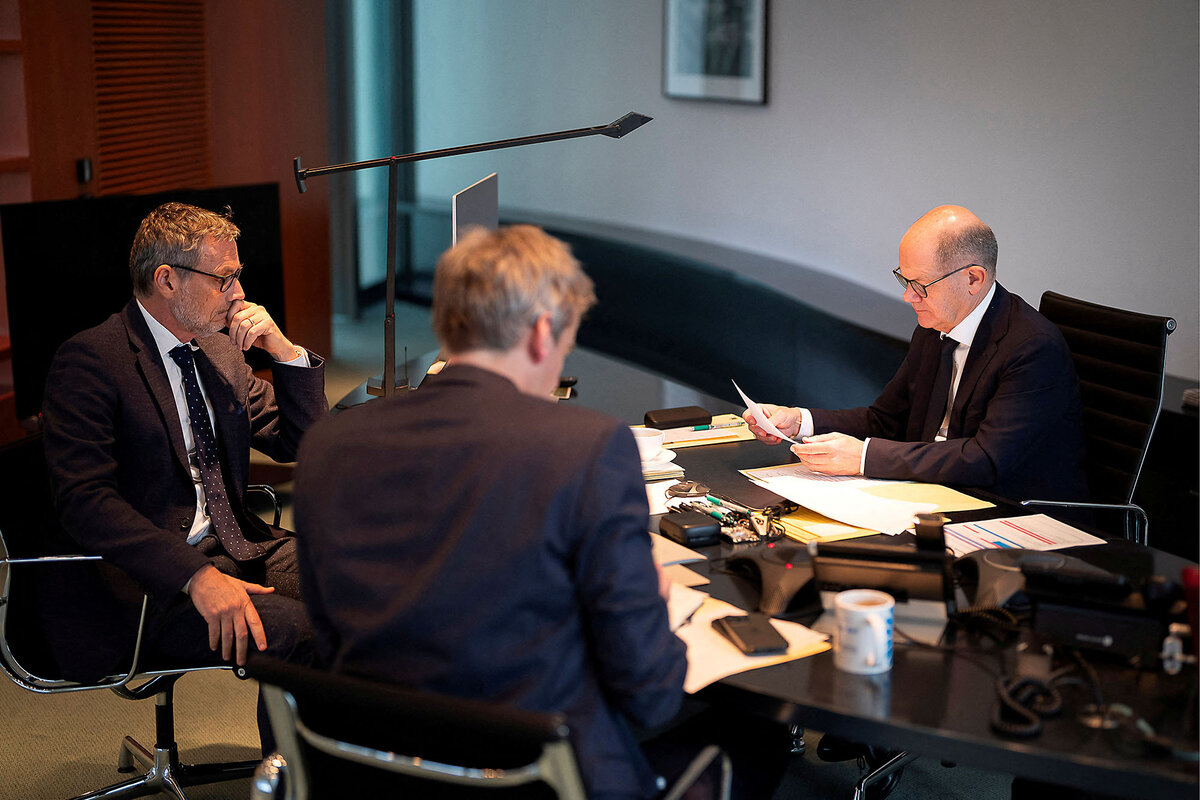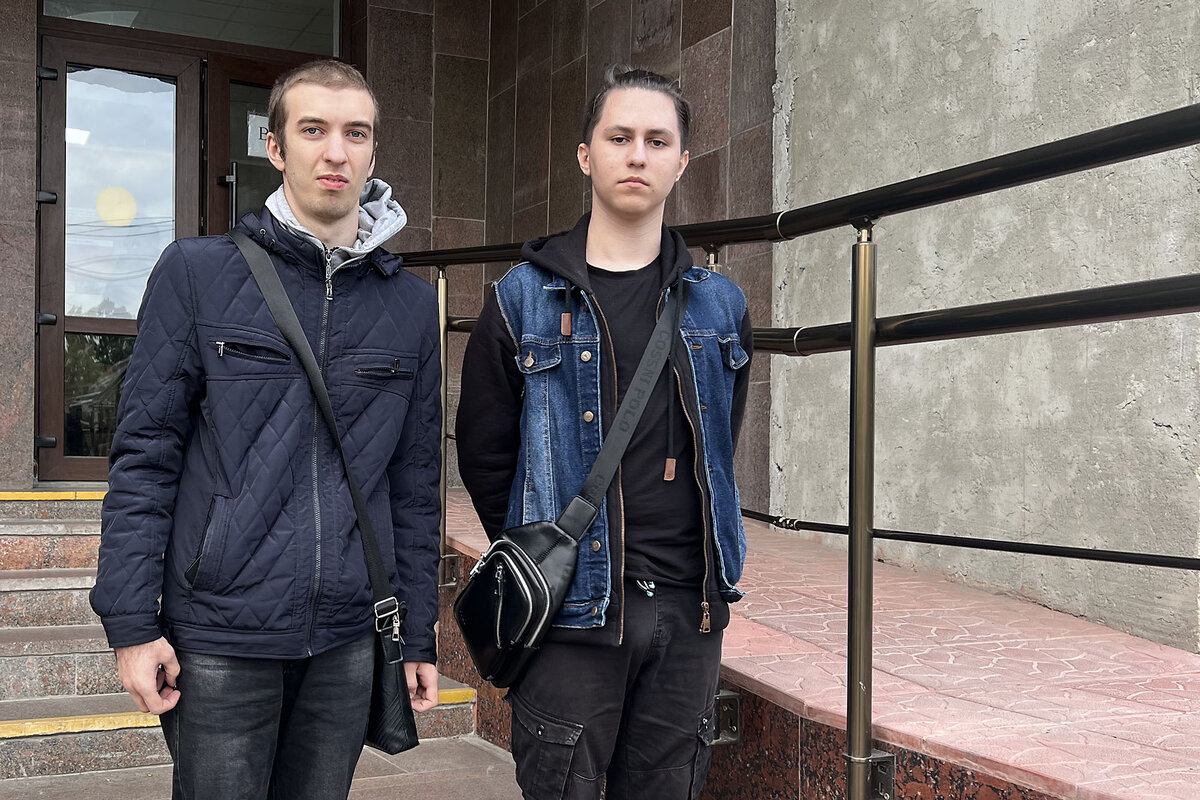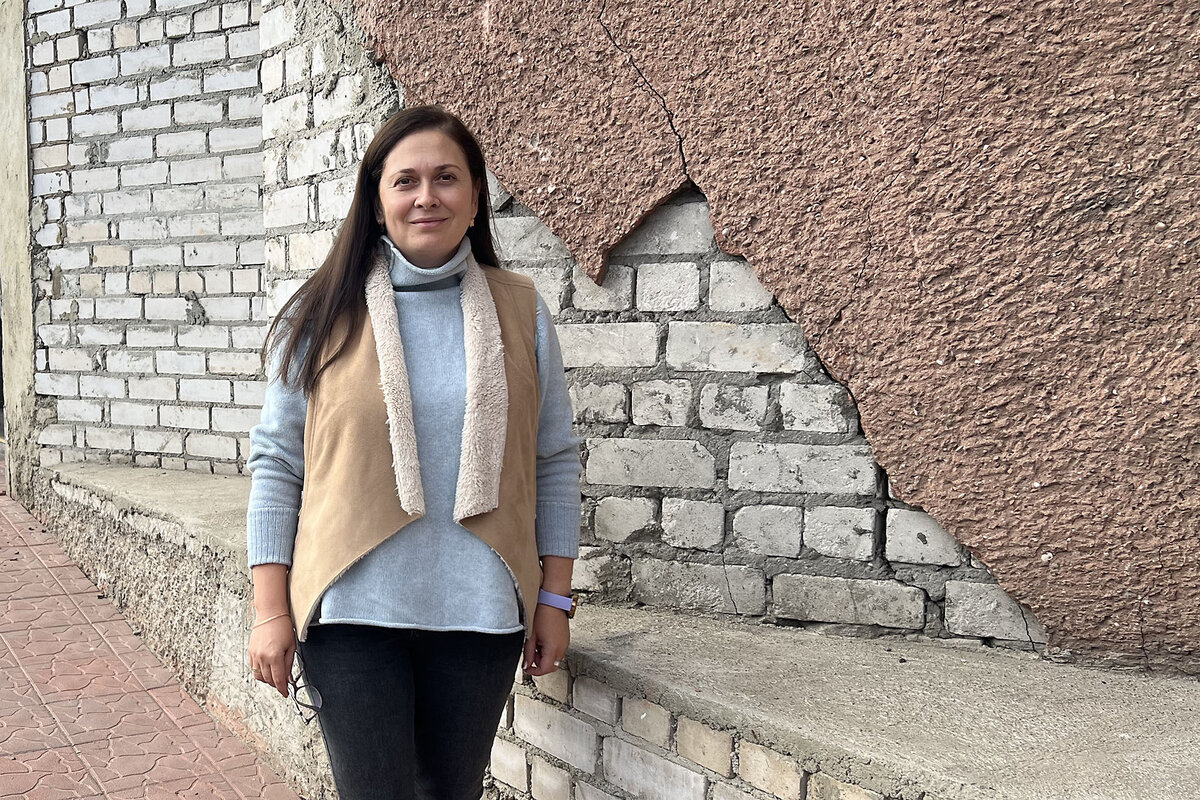Why many in Ukraine oppose a ‘land for peace’ formula to end the war
Loading...
| MYKOLAIV, Ukraine
Standing on the shrapnel-pocked steps of Mykolaiv’s Black Sea National University, second-year engineering student Yevhen ponders the seductive appeal of the formula “land for peace” for ending Russia’s war against Ukraine.
And then, like many of his fellow Ukrainians, he firmly rejects the idea.
“It sounds very good if it could end the war, but the truth is that if you give Russia one meter of territory, they will see that as weakness, and they will not stop until they take everything,” says Yevhen, who asked that his last name be withheld.
Why We Wrote This
A story focused onShould Ukraine relinquish territory seized by Russia in return for an end to fighting? Opposition had been strong throughout the long war, but Ukrainians are shifting on whether their territory is inviolate. Still, distrust of Vladimir Putin runs deep.
“We Ukrainians know this,” adds the student, whose city was blasted and bombed – but never occupied – following Russia’s invasion of Ukraine in 2022. “But it’s something the world must understand as well.”
For months Russia has advanced – slowly and at great cost, to be sure – along much of the war’s battlefront. That has fueled doubts that Ukraine’s military will ever reclaim significant swaths of lost territory.
Moreover, Russia’s steady gains have fed resignation that any peace deal will entail giving up much if not all of the 20% of Ukrainian territory Russia now occupies.
The impending return of former President Donald Trump to the White House is only the latest element in mounting pressure on Ukraine to reach a negotiated settlement with Russia.
Last week German Chancellor Olaf Scholz spoke with Russian President Vladimir Putin about ending the war, the first conversation between the two in nearly two years. The German government said Mr. Scholz expressed full support for Ukraine.
Even so, the outreach was panned by some NATO members and widely interpreted as another sign of fading Western interest in sustaining Ukraine’s military effort – and growing interest in a negotiated settlement.
Even President Joe Biden’s decision to allow Ukraine to use U.S.-supplied missiles to strike deeper inside Russia is seen by many analysts as an effort to position Ukraine better for the negotiations Mr. Trump is expected to push for, rather than to boost Ukraine’s ability to win the war.
Signs of escalation before any negotiations continued Thursday, as Ukraine said Russia had launched an intercontinental ballistic missile armed with conventional warheads at the central city of Dnipro. Russia refused comment, and U.S. officials reportedly said it was more likely an intermediate range ballistic missile. On Wednesday, President Biden authorized supplying Ukraine with antipersonnel mines to thwart Russia’s ground assault.
Public opinion shift
As Russia’s full-scale invasion – what Ukrainians now call “the big war” – reaches 1,000 days, signs are growing that more Ukrainians are shifting in favor of entering negotiations with Russia.
Moreover, a growing number appear to have resigned themselves to the once-taboo prospect of ceding territory to reach a deal.
A Gallup poll of Ukrainians published this week finds that more than half want to see negotiations start as soon as possible – up from about one-quarter a year ago. And the same proportion, 52%, says the country should be willing to give up territory to end the war.
That view is echoed by Black Sea student Yevhen’s friend Andrii, who says Ukraine’s priority now must be ending the loss of life.
“There are two sides to this question of giving up land for peace,” he says. “I understand that for some people, giving up land would be dishonoring the soldiers and others who died defending Ukrainian territory,” says the engineering student. “But if by giving up land for peace you save Ukrainian lives, that view has value, too.”
Yet even as more war-weary Ukrainians appear ready to accept ceding territory, many remain adamant that what is at stake is not just some eastern provinces bordering Russia, but Ukraine’s existence as an independent nation.
Indeed, the notion remains strong that Ukraine’s acquiescence to Russia on the territorial issue would send a devastating signal around the world that force prevails over the rule of law.
“False promise”
For many Ukrainians, their country’s long history with the Russian Empire, the Soviet Union, and now Mr. Putin’s Russia, offers proof that no deal involving Russian-occupied territory will satisfy Mr. Putin’s real goal: reconstituting the former USSR.
“With this war, we are talking about two very different things, either an independent Ukraine that sets its own course and decides its own future, or Ukraine as part of Russia,” says Anastasiia Khmel, dean of the faculty of political sciences at Black Sea National University.
As a result, “We have come to the conclusion that part of our territory would not be enough, [that] just the occupied lands would never guarantee peace,” she says.
Explaining why “land for peace” is a “false promise,” Professor Khmel says Russia’s real goal – as she says Mr. Putin has made clear – is complete domination of Ukraine. And that, she adds, means more than just territorial control, but “repression of Ukrainian identity and Ukrainian culture as it has occurred throughout the past 300 years” of Russian imperialism.
Others agree that ceding land would mean much more than a smaller Ukraine.
“In Russia they don’t have a normal conception of national borders; they are thinking in terms of what were the borders of the Soviet Union,” says Mykhailo Ziatin, a Mykolaiv poet and mathematician who has joined a nearby military unit to help repel the invading forces. “That means Russia is not a normal entity you can negotiate with, but an aggressor who would see a land deal as a step and not an end.”
And there is another dimension to the land issue that Ukraine is confronting, not just for itself, Mr. Ziatin says.
“We Ukrainians don’t want to give up the lands we are responsible for to evil; we are taking a stand that force is not right,” he says. “That is a conviction that should matter to our Western neighbors and to the world.”
For the Western democracies that support Ukraine, Mr. Ziatin says, the question is “Are you OK with rewarding the monster who wishes to make our democracy impossible; do we really want to give up anything to that beast?”
Distrust of “guarantees”
That Ukrainians do not trust Mr. Putin to abide by any settlement for very long is hardly news, given how he has been seizing Ukrainian territory since 2014.
More surprising perhaps is their deep mistrust of any “security guarantees” they anticipate Ukraine’s Western partners would offer as part of a “land for peace” deal.
“We already learned the hard way that any deal based on vague security assurances comes with no means to enforce it, and that is the definition of a bad deal,” says Yevhen Hlibovytsky, director of Frontier Institute, a Kyiv think tank. “If Russia is rewarded now for its bad behavior, why should it not return to that bad behavior in the future?”
As many Ukrainians are wont to do, Mr. Hlibovytsky refers to the 1994 Budapest Memorandum, under which a newly independent Ukraine gave up the world’s third-largest nuclear arsenal in exchange for assurances from world powers, including Russia, that the “inviolability” of its borders would be respected.
The Budapest Memorandum “obviously didn’t work,” Mr. Hlibovytsky notes, leading him to foresee dire global consequences if Ukraine is forced into another accord now.
“If Ukraine has to cede territory in exchange for another set of vague security assurances,” he says, “that’s an invitation to broader nuclear proliferation around the globe.”
Mr. Hlibovytsky says average Ukrainians carry in their hearts the same basic convictions about the rules for achieving international peace.
“People on the street will tell you the same thing, just with more four-letter words than a smooth-talking academic uses,” he says. “They sense that Ukraine is something like a test for what rules and order govern the world going forward.”
“If the West is not committed to what it has said are its own standards and values,” he adds, “then they feel they have been fooled, and Ukraine is being betrayed.”









